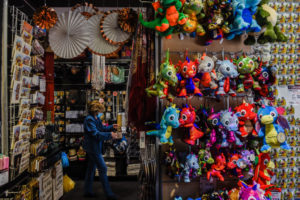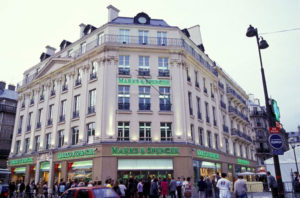The most fun I ever had spending money was during a shopping spree at a toy store. It was almost Hanukkah, which falls near my birthday, and my parents asked me what they should get me for both occasions. I told them I didn’t want them to pick things out for me, I wanted to pick things out for myself. I wanted to enact what I had seen on TV: children running gleefully through Toys R Us, grabbing this and that off the shelves. My parents were put out by the request: because it took place not on my sixth birthday, or my tenth, but rather my eighteenth.
I was not a child, they said: I shouldn’t be playing with toys. But they eventually relented, handing me the amount they would have spent on presents — $200 — and telling me I could do whatever I wanted with it. So off I set for my spree, taking my six-year-old sister with me. We circled around the store again and again, arrived at a provisional list, deliberated carefully over what might be substituted for what, mystifying the employees — upon whom it slowly dawned that the pile of toys growing on the counter was intended not for my sister but for me. I asked for each one to be wrapped individually.
I have such a vivid memory of this experience — the avaricious thrill of thinking that almost anything in the store could be mine, the absurd freedom to possess things of which I had absolutely no need — but I do not remember what I ended up buying. I cannot name even one toy I purchased that day, and I do not know whether any of them are still with me. It was on this day, on the eve of adulthood, that I approximated the ideal of consumerism, the frenzied mania that is the pure joy of shopping.
Much later, I read some books by social scientists that sought to explain this phenomenon. In his Theory of the Leisure Class, for instance, Thorstein Veblen explains that “conspicuous consumption” is a way of signalling that one is above engaging in productive labour: “A detailed examination of what passes in popular apprehension for elegant apparel will show that it is contrived at every point to convey the impression that the wearer does not habitually put forth any useful effort.” In The Affluent Society, Kenneth Galbraith lays out what he calls “the dependence effect”, which is that capitalism reverses the relationship between production and desire. Instead of producing things in order to satisfy people’s antecedent desires and needs, a wealthy capitalist society has an antecedent commitment to production, which means: “It accords to the producer the function both of making the goods and of making the desires for them.”
All of that made some sense to me, but I was unsatisfied, feeling that phrases such as “conspicuous consumption” and “dependence effect” obscured as much as they revealed. They didn’t explain the powerful drive that animated me in the toy store, versions of which I continue to feel to this day when I shop. But then I read a novel by Émile Zola.
The Ladies’ Paradise — Au Bonheur Des Dames — is named for the department store that is the novel’s true protagonist. It is described alternately as a monster, a machine, a colossus, a cathedral, and over the course of the novel it grows — in power and influence, in financial success, and in physical size, as it expands along the street to swallow up the small businesses that had flourished in the neighbourhood for generations. The fictional store and its fictional owner, Octave Mouret, are based, respectively, on Le Bon Marché, one of Paris’ first department stores, and the businessman Aristide Boucicaut, who grew a 3,000 square foot novelty shop with a handful of departments — buttons, lace, ribbons, umbrellas — into a 55,000 square foot colossus that sold everything. Zola carefully researched the business practices detailed in the novel: the replacement of haggling with fixed prices, the use of advertising, the introduction of returns and sales and discounts, the giant displays to encourage window-shopping, the routine rearrangement of the store to confuse customers into spending more time within its walls. The author’s journalistic eye for detail takes the reader back in time to watch something new coming into being — a new type of desire, a new set of human relationships, a new form of life. We witness the birth of shopping.
It is very hard not to be a moralist about capitalism. Veblen and Galbraith fall into the trap: one can hear the distaste in a phrase like “conspicuous consumption”. And these days, we are so accustomed to the word “capitalism” being followed by moralism that it comes as a shock to encounter Zola, who wants to talk to us about economic growth, about the lust for luxury goods, about the power of advertising and the many guises it can take, about the mannerisms of rich shoppers and the working conditions of the poor people who serve them — and yet doesn’t want to preach to us about any of those things. He wants to show you the splendours and the horrors of something; he wants to help you understand.
The novel is filled with lavish descriptions of stuff, ecstatic prose poems to fabric — silk, in particular — to colour — white, in particular — that awaken the reader’s own acquisitive impulses. These encomia are so compelling that I found myself thinking: wouldn’t it be nice to have those buttery soft gloves, that colourful parasol, some Alençon lace! And so, when one reaches the descriptions of the heated frenzy of the crowds that descend on the store to strip it of its wares like locusts, one doesn’t view these people from a refined, superior, judgmental distance; one locates oneself among the throng, having become, alongside it, one of the store’s fervent admirers.
But of all the novelists I have read, Zola is least likely to hide the ugly truth. He is brutally direct in showcasing the damage wrought by The Ladies’ Paradise. You are introduced to the artisanal work of the umbrella store owner, who carves handles into animal shapes by hand — only to be forced to watch him squeezed out of existence as Mouret’s shop surrounds him. In a different subplot, a generations-long tradition of handing a shop down from parents to children is suddenly and permanently severed, and you see the violent effect on all those whose lives were predicated on its continuation. One by one, such people try to “stand up to” Mouret; one by one, they fail. One person attempts suicide; a second wastes away from sheer sadness, which causes a third to waste away, too. Even those shopkeepers who escape the net of death manifest such a strong insistence on “going down with the ship” that one cannot help but conclude: their lives are over.
If we turn our attention inside the store, to those who “benefit” from its existence, the horrors are equally many. The saleswomen are trapped inside it, forced to eat the terrible food offered in the cafeteria and sleep in unheated rooms where they nearly freeze to death in winter; if they wish to leave, even on a day off, they need permission. These women had few employment alternatives, so apart from room and board they were at first only paid on commission, and lived in terror of being fired — turned out onto the street, with nowhere to go. The result is a cut-throat, competitive atmosphere among the sales force, which contrasts sharply with the atmosphere of the small family shops, where the good of one is the good of all. When it comes to the customers, Zola shows you how the store’s irresistible attractions inflame their greed, inducing them to spend more than they can afford, and driving even “respectable” women to shoplifting.
For all the suffering it causes, the Ladies’ Paradise is a place of passion, filled with energy. The people inside of it may be a bit crazed with the desperation to buy, or the desperation to sell, but they are noticeably alive, when juxtaposed with the surrounding neighbourhood, which reeks of darkness and decay. And this, in the end, is the sharpest contrast in the novel: between the lively, colourful world of the department store, and the stagnant and despondent world outside of it. As much as you empathise with the umbrella store owner, there is no question as to which way the future lies. What Zola showcases about capitalism is that it is a powerful source of optimism, of momentum; and that people, once they become wealthy enough to attend to something other than survival, need some such engine. The difficulty that he implicitly raises for any alternative to capitalism is not the usual one, about efficiency: how will the system be organised in such a way as to avoid poverty for all? It is instead a motivational difficulty: assuming it does avoid poverty for all, what will move and inspire and incite those people?
Zola wrote the kinds of novels critics love to trash, which is to say, the kinds of novels people actually enjoy: a contemporary journalist described him as “the most violently attacked and the most widely read author of his generation”. Zola understood that ordinary readers read for the plot: for romantic tensions, reversals of fortune, character-testing crises. The Ladies’ Paradise comes complete with a plucky heroine — and a will-they-or-won’t-they love story that keeps you turning the pages.
Nonetheless, all of that is secondary. Zola, who lived at the time when social science was beginning to come into its own as a field of research, could be described as the novelist who moonlit as a social scientist. This is why Havelock Ellis, a pioneer in the study of sexuality, wrote: “To look at Zola from the purely artistic standpoint is scarcely to see him at all.” When Zola is telling a story, he’s not only telling a story. While he has your attention, while you’re held in suspense over the heroine’s fate, you find yourself examining the inner workings of this colossus, this department store; you become captivated by its power. And slowly, over the course of the novel, you find yourself confronted by an uncomfortable thought.
The thought is precisely what the TV adaptation of the novel steers you carefully away from. The BBC’s attempt is remarkable chiefly for how systematically it erases the brutal truths that saturate Zola’s text. The store is a fraction of the size depicted in the novel; we never see frenzied crowds; there is no shoplifting, no seasonal firing of employees; no one is driven to purchases she cannot afford; apart from a few “bad seeds”, the employees are loyal and friendly to one another; and when the neighbourhood shops stand up to Mouret (here renamed “Moray”), they retain their dignity and achieve some measure of success. The show is set not in Zola’s rapidly changing world, but our fantasy of the time that preceded it.
We are living in the world Mouret made, but we don’t want to accept it. We like to imagine ourselves surrounded by hand-carved umbrella heads; we continue to find the image of that artisanal old world comfortable, appealing and familiar. In other words, we find the real world — the one we actually live in — somewhat terrifying and alien. We don’t have an intuitive understanding of capitalism, of the desires it creates in us, of the relationships it throws us into. We don’t understand why we like shopping, and often pretend that we don’t. We will come up with an excuse as to why we “have to” buy something. Dating profiles tell us that people love to travel, or read, or hike, never that they love to shop. When a hobby requires expensive gear, this often makes it secretly more appealing — a reason to shop! — not less. The fact that these secret urges are now driving the show: that is the uncomfortable thought.
For all the imaginative pleasure we take in the reassuring smallness of Moray’s shop, when it comes to actual shopping, we choose more and more of Mouret. After rejecting the small store in favour of the department store, we rejected the department store in favour of the shopping mall, and the mall in favour of Amazon. We willingly move deeper and deeper into a world that doesn’t feel like home, that maybe never will. And it is Zola who offers us a front row seat to the opening act of this drama, a chance to watch the new world rising from the ashes of the old, a chance to come to terms with the creatures that we have become.
Disclaimer
Some of the posts we share are controversial and we do not necessarily agree with them in the whole extend. Sometimes we agree with the content or part of it but we do not agree with the narration or language. Nevertheless we find them somehow interesting, valuable and/or informative or we share them, because we strongly believe in freedom of speech, free press and journalism. We strongly encourage you to have a critical approach to all the content, do your own research and analysis to build your own opinion.
We would be glad to have your feedback.
Source: UnHerd Read the original article here: https://unherd.com/





